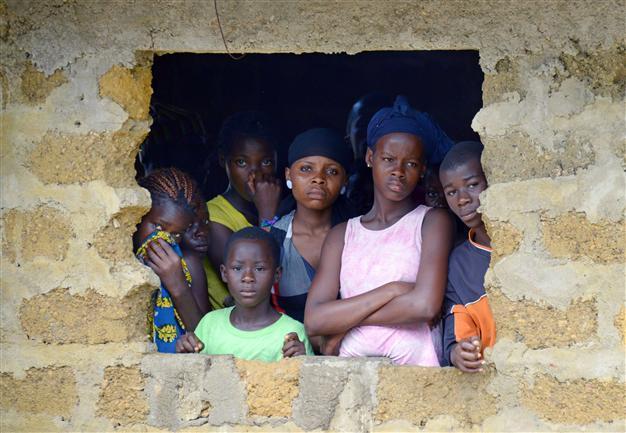EU pledges 140 mn euros for Ebola-hit West Africa
BRUSSELS / GENEVA - Agence France-Presse

The neighbors of an Ebola virus victim look at medical workers of the Liberian Red Cross carry his body on September 4, 2014 in the small city of Banjol, 30 kilometres of Monrovia. AFP Photo
The European Union on Friday announced 140 million euros ($183 million) in funds to fight the deadly Ebola virus in West Africa, a sharp increase over its previous aid as the outbreak worsens.
The commission said the aid was necessary to boost measures to stop the "worst ever outbreak of the epidemic" from ravaging Guinea, Sierra Leone, Liberia and Nigeria.
"Today the commission is unveiling a 140-million-euro package of funding for all the countries currently affected by the Ebola virus," European Commission spokesman David Sharrock told reporters.
The aid is designed to boost overstretched health services, fund mobile laboratories for detecting the disease, safeguard the provision of food, water and sanitation as well as help the broader economy and strengthen overall public services.
"An essential part of halting the epidemic is getting support to the health services," said Sharrock, spokesman for International Cooperation, Humanitarian Aid and Crisis Response.
About a third of the assistance would go towards strengthening healthcare systems in affected countries, he said.
The formal announcement was made by EU Commissioner for Development, Andris Piebalgs, during a trip to Benin.
Sharrock said the EU had previously committed 12 million euros in aid to fight Ebola, with the sharp increase reflecting the gravity of the crisis.
"A crisis caused by the Ebola virus is threatening the entire region. This is the worst outbreak ever of the epidemic," Sharrock said.
The World Health Organization put the official Ebola death toll at 1,841, out of a total of 3,685 cases in Guinea, Sierra Leone and Liberia.
Kristalina Georgieva, EU Commissioner for International Cooperation, Humanitarian Aid and Crisis Response, said the situation in the Ebola zone was "going from bad to worse."
"We are helping make a difference on the ground, but the needs are outpacing the international community's capacity to react," she said.
"We need to pool our efforts and provide adequate air transportation and medical equipment to our partners in order to fight this menace."
WHO mulls untested Ebola drugsHealth experts honed in Friday on a handful of unproven drugs they hope might turn the lethal tide of Ebola, as key figures urged that funds go for frontline crisis care in some of the world's poorest states.
On the second and last day of talks in Geneva, the World Health Organization-led group discussed fast-tracking two potential vaccines and eight potential therapies, including the drug ZMapp that has been used on a handful of frontline workers.
With no fully tested treatments for Ebola, the WHO has endorsed rushing out potential cures like ZMapp -- a call echoed by African doctors battling the epidemic that has taken some 1,900 lives so far.
"Everybody keeps asking why isn't this medication made available to our people out there?" Samuel Kargbo, from Sierra Leone's ministry of health, told AFP.
The WHO said "extraordinary measures" were in place to accelerate the pace of clinical trials -- but admitted that even that would likely not allow "widespread use before the end of 2014".
Abdulsalami Nasidi, project director at the Nigeria Centre for Disease Control, nevertheless said the Geneva discussion "gives a lot of hope to the African people affected and those who are in panic".
ZMapp has been given to about 10 infected health workers, including Americans and Europeans, of whom three have recovered.
Current stocks are exhausted, but the WHO said a few hundred doses could potentially be ready by the end of the year.
